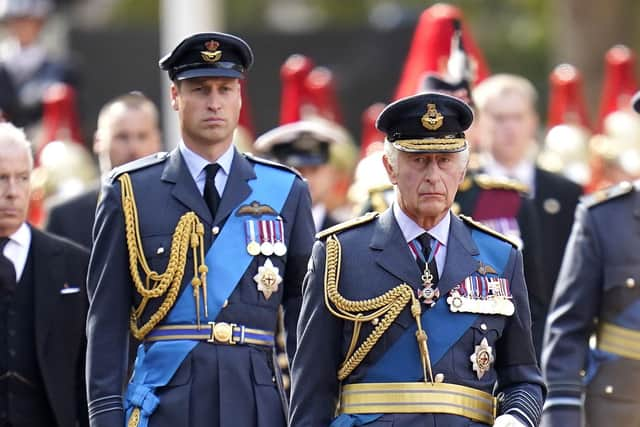After Queen Elizabeth, Royal Family can thrive but only if King Charles embraces Scandinavian-style monarchy – Joyce McMillan
It is a hushed and solemn scene, as it should be; the glorious colours of the royal standard draped over the bier, the guards in elaborate dress uniform, the soaring architecture of the hall itself.
What is absolutely clear, though – as the slow-moving procession of citizens enters the hall and passes by – is that these mourners are a remarkably diverse band, young and old, of all races and colours, dressed smartly or casually; and when they approach the coffin, their reactions are as varied as their appearance.
Advertisement
Hide AdAdvertisement
Hide AdMost simply walk by, with a long respectful look. Some stop to bow, and those with a history of military service sometimes salute. A few women pause to curtsy, while some people weep, wiping their eyes as they walk away; and it occurs to me that we will never fully know what most of these people were thinking, as they reached the head of this huge queue.
Some doubtless see this journey as an essential pilgrimage, after a lifetime of devotion to the idea of royalty. And some, we can guess, will be there because they are wondering whether this historic moment marks something more than the end of a single reign; whether the death of this remarkable woman and monarch will lead to a time of much deeper change, including more debate about the idea of monarchy itself.
And it follows, from this quiet grassroots pageant of diversity, that neither the people of the UK, nor the monarchy itself, are being particularly well served by the avalanche of hyper-royalist mourning and unctuous establishment sentimentality that has been delivered by some of our mainstream broadcasters over the past week; and that in crafting a monarchy fit for purpose in the 21st century, King Charles and his heirs should be now taking note of the real diversity of public attitudes across the four nations, rather than the pseudo-unity evoked by some media.
That such a thing can be crafted is obvious, to anyone who looks around this corner of north-west Europe. It is an inconvenient fact, for those who believe that monarchy is intrinsically reactionary, that three of the four most successful social democracies on Earth – Norway, Denmark and (so far) Sweden – are constitutional monarchies; so is the Netherlands, one of Europe’s most liberal nations.


The path to that kind of future for the British monarchy, though, demands that it detach itself, diplomatically but firmly, from that reactionary and nostalgic strand of British politics that has been so much in evidence in this week’s coverage; and is now inflicting profound damage on the very possibility of monarchy as a unifying force, in a nation increasingly scarred by social inequalities and divisions.
In practical terms, for King Charles and his heirs, this means that they need to do several things, with some urgency.
First, they need to ditch their remaining tax privileges, and pay tax on the same basis as all other British citizens; and they need to open up a wide-ranging and transparent debate about their vast land holdings, and how these can best be used to serve the interests of the people, in a time of immense threats to our natural environment.
Secondly, they need to find a way of dealing with the allegations against Prince Andrew that does not reek of privilege and impunity; and they need to do everything in their power to stop the sustained media bullying and ostracising of Prince Harry and Meghan, with its foul racist overtones.
Advertisement
Hide AdAdvertisement
Hide AdAnd finally, on the matter of Scotland, the royal family – which has traditionally understood very well that the UK is a Union of four nations – should respect the genuine division of opinion in Scotland over independence, and refer back to their voluminous experience of remaining heads of state in countries such as Canada after political independence.
They should make it crystal clear that the future political arrangements among the four nations are a matter for democratic decision; and that they are ready to continue to serve as heads of state, if asked to do so, whatever the outcome.
To do all this, of course, would be to make a major break with the decaying imperial dream of the British state that has too often been on parade this week, with its fantasies about the Commonwealth somehow acting as a substitute for our lost EU membership, and about a Scottish people as united in support for monarch and Empire as they might have been in 1890 or 1918. If the House of Windsor wants to survive and thrive in the 21st century, though, it seems to me that these are the changes that must be made.
I know that many in Britain will take pride, on Monday, in the beautifully rehearsed ceremony, and the mighty public theatre of ritual, surrounding the Queen’s funeral and interment.
What I also know, though, is that all good theatre has to reflect a truth, rather than being used to disguise a lie, and that that ceremony will have dignity and meaning precisely because the Queen herself gave it meaning, through a lifetime of hard work and service.
The task facing her heirs, now, is to make that meaning anew for our time, to rededicate themselves to those unfashionable values of humility and service, and to strip away some of the vacuous and decadent flummery to which we have been subjected this week; or to see their institution sink under the weight of an imperial history that has had its day, and from which it may not be able to detach itself, in good time.
Comments
Want to join the conversation? Please or to comment on this article.

